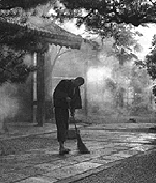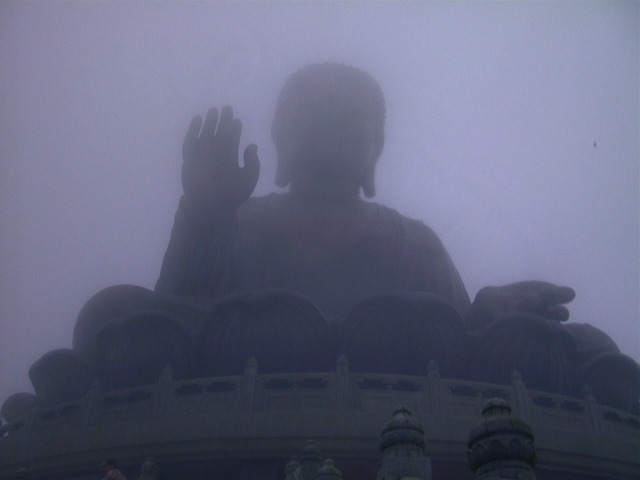(771-853)
Hsiang-yen decided that it was all too much for him and he would surrender. He went away and found a sacred site, the grave
of the Sixth Patriarch of Chinese Zen, Hui-neng, and maintained it as a shrine. Day in and day out he had no thought about
the world except his sweeping. Then one day, sweeping away, he swept a pebble into a bamboo grove beside the shrine. The
pebble hit a piece of hollow bamboo and went "ping!" and he jumped up and down. The "ping!" shook him to pieces and he said, "One ping! and I have forgotten all I knew!" and he composed a poem in his
excitement: "Last year's poverty was not true poverty, this year even the wind can get through". Hsiang-yen was Enlightened
A Zen student called Hsiang-yen went to dokusan with Kuei-shan Ling-yu (771-853) , the T'ang dynasty master, and Kuei-shan gave him a
koan, of which over and over he was unable to see into it's mysteries.

Kuei-shan Ling-yu was the pre-eminent successor of Pai-chang Huai-hai and known in the Blue Cliff Record for cases 4, 24, and 70. His community was known to number more than fifteen hundred and according to the Record produced forty-three Enlightened disciples.
One of those disciples was Hsiang-yen who was originally a novice under Pai-chang; he was exceptionally brilliant and quick witted, strong in analytical power and logical acumen, and versed in the scriptures. But he was not initiated into Ch’an (Zen). At the death of Pai-chang, he made himself a disciple of Pai-chang’s senior disciple Kuei-shan. Kuei-shan said to him, "I hear that when you were with our late Master Pai-chang, you could give ten answers to a single question…..This shows your remarkable intelligence and ingenuity, which enables you to understand ideas and unfold their consequences. Now the question of birth and death is the most fundamental of all. Try to tell me something about your state before you were born of your parents."
This question plunged his mind into a thick fog. He did not even know what to think. Returning to his room, he made a feverish search in all the books that he had read for something appropriate to say in answer to the question; but he could not find a single sentence that could be used.
So he sighed to himself, saying, "As the saying goes, a painted cake satisfies not the hunger." After that, he pressed his master time and time again to break the secret to him by speaking explicitly. Every time Kuei-shan said, "If I should expound it explicitly to you, in future you will reproach me for it. Anyway, whatever I speak still belongs to me, and has nothing to do with you."
In his despair, Hsiang-yen, not unlike his contemporary in Zen ways, Te Shan, burnt all his books, saying, "In this life I will not study Buddha dharma any more. Let me become a mendicant monk ever on the move from one place to another." He took leave of his master weeping. His wandering brought him to the ruins of a temple associated with the memory of Master Hui-neng. There he made his temporary abode.
One day as he was mowing and cutting the grass and trees, he tossed at random a piece of broken tile, which happened to hit a bamboo tree, causing it to emit a crisp sound. Startled by the unexpected sound, he was suddenly awakened to his true self not born with his birth. Returning to his cell, he bathed himself and lit incense to pay his long-distance obeisance to Kuei-shan, saying, "O Venerable Abbot, how great is your compassion! I am grateful to you more than to my parents. If you had broken the secret to me then, how could I have experienced the wonderful event of today?"
Ponder the fact Hsiang-yen realized the Way by the sound of bamboo; that another clarified the mind at the sight of peach blossoms. How could it be possible to differentiate smart bamboo trees from dull ones, or deluded ones from enlightened ones? How could there be shallow or deep, wise or stupid, among flowers? The flowers bloom every year, nevertheless, not everyone attains Enlightenment by viewing them. Stones often strike bamboo, still not everyone who hears the sound clarifies the Way. Only through the virtue of long study and continuous practice with the assistance of diligent effort in the Way does one realize the Way or clarify the mind. This did not occur because the sound of bamboo was especially wonderful, nor because the color of peach blossoms was particularly profound. Although the sound of bamboo is marvelous, it does not sound of itself; it cries out with the help of a piece of tile. Although the color of peach blossoms is beautiful of themselves; they open with the help of the spring breeze. The condition of practicing the Way is also like this. (source)
Another Ch'an master who had an encounter with Kuei-shan was the female monk known as Iron Grindston Liu (Liu T'ieh-mo). The dates of her birth and death are unknown. She lived in a hut ten miles from Kuei Mountain where the famous Ch'an master lived. She had practiced Ch'an for a long time and her insight was said to be very deep. One day she went to visit Kuei-shan. The Pi-yen lu records their conversation:
Iron Grindstone Liu arrived at Kuei-shan. (Commentary: Being unaware of the difficulty of getting accommodations, this old lady was out of her depth.)
Kuei-shan said, "Old cow, you've come!" (Comm. Check! A probing pole, a reedshade. Where should you look to see the obscurity?)
The Grindstone said, "Tomorrow there's a great communal feast on (Wu) T'ai Shan; are you going to go, teacher?" (Comm. The arrow is not shot to no purpose. In China they beat the drum, in Korea they dance. The letting go was too fast, the gathering in is too slow.)
Kuei-Shan relaxed his body and lay down. (Comm. The arrow got him. Where will you see Kuei Shan? Who realizes that in the far-off misty waves there is another more excellent realm of thought?) The Grindstone immediately left. (Comm. She's gone. She saw the opportunity and acted.)
Information for the above drawn from "The Golden Age of Zen" edited by John Chwan-Hwa Wu, Image Books (1996).
RECOUNTING A YOUNG BOY'S NEARLY INSTANT TRANSFORMATION INTO THE ABSOLUTE DURING HIS ONLY DARSHAN WITH THE MAHARSHI
SHANGRI-LA, SHAMBHALA, GYANGANJ, BUDDHISM AND ZEN
HUI SHEN: BHIKSHU
Fundamentally, our experience as experienced is not different from the Zen master's. Where
we differ is that we place a fog, a particular kind of conceptual overlay onto that experience
and then make an emotional investment in that overlay, taking it to be "real" in and of itself.

(PLEASE CLICK)
|

HERE FOR
ENLIGHTENMENT

ON THE RAZOR'S
EDGE
Bodhidharma, Hui'ko, Hui Shen, Hui Neng, Shih-t'ou Hsi-ch'ien, Zhaozhou, Moshan Liaoran, Mugai Nyodai,
Nagarjuna, Ganapati Muni, Kuan Yin, Miao Shan, Tung-Shan, Lin Chi, Te Shan, Dogen
